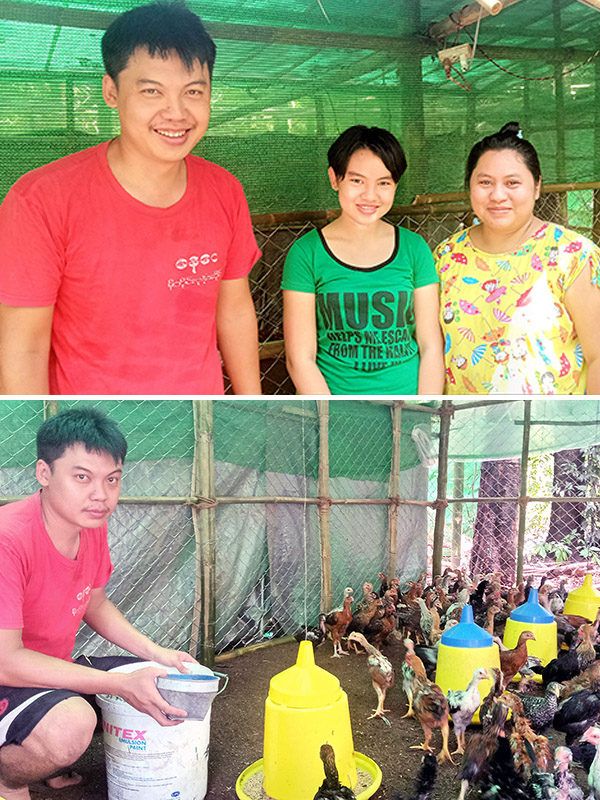Stories of Change

Top: Saw Edmond, Eint Phoo Myat and Mi Mi. Bottom: Saw Edmond feeds some of the chickens.
A chicken hatchery’s largest order ever in Myanmar
Chicken farm owner Saw Edmond lives in Ywar Thit Pine Village on the outskirts of Yangon, Myanmar. He and his wife, Mi Mi, have owned and operated their hatchery business for the past twelve years.
After years of struggle, the couple now have a profitable business. When they first started, they didn’t know the first thing about running a hatchery. They could neither identify chickens by breed, nor how to guard against livestock diseases. Now, they raise and sell Chittagong breed chickens. Saw Edmond and Mi Mi grew and improved their business through years of study and mentoring from other, more experienced hatchery owners. Their sixth-grade daughter, Eint Phoo Myat, helps with some chores around the hatchery when she’s not in school.
In 2019, Myanmar’s Livestock Breeding and Veterinary Department reported that chickens were the most common farm animal for families in Myanmar, with more than 70 million in the country. The next most common was cows at 9.5 million, which shows that chickens are clearly the top choice for families. The Chittagong hens that Saw Edmond and Mi Mi raise start laying eggs when they are six months old. They continue to lay eggs until they are about four years old, and one hen can lay upwards of 100 eggs. Farmers and hatchery owners usually keep Chittagong hens for about five years before they humanely slaughter them.
Mi Mi and Eint Phoo Myat collect eggs daily to put them in a cool and dry place before moving them in an incubator. Chicks hatch 21 days later and are moved with their age cohort to designated areas on the farm. The family feeds and vaccinates the chickens for the first four months, and then the baby hens are mature enough to sell to a family as egg-laying hens.
“At first, I sold each mature chicken for 3,500 Kyats ($2.49) each. We saved our money and invested in incubators with capacity for up to 1,000 eggs. And now I have 230 hens laying eggs daily. After paying farm hands daily wages for manual work, and then subtracting feed and vaccine costs, I make about 60,000 Kyats ($42.70) profit per day. COVID-19 didn’t affect my business as I already had feed and vaccine reserves for 3 months,” Saw Edmond explained.
Most customers come from neighboring villages. The average order is approximately 100 chicks. Recently, though, Saw Edmond received his largest order ever. It was for more than 3,000 chickens.
CWS was the customer.
As part of our program to help families overcome hunger and poverty in Myanmar, we are distributing chickens to thousands of families. Each family receives a small starter flock as well as information and workshops on raising chickens, building chicken coops, making chicken feed and keeping their flock healthy. When possible, we purchase supplies from local vendors to support the local economy. Saw Edmond is one of those vendors.
Saw Edmond was grateful to receive this historic order from his hatchery. “I appreciate CWS for these large orders, since the revenue is helpful for our general operations and livelihood. I also want to invite CWS and interested people to visit my hatchery; I will explain you everything you want to know, ” Saw Edmond said with joy.
